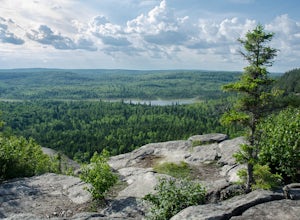## What is Dispersed Camping?.
Dispersed camping, also known as primitive camping or backcountry camping, is a form of camping that takes place outside of designated campgrounds. It offers campers the opportunity to experience a more remote and secluded camping experience, often with fewer crowds and more privacy..
Dispersed camping sites are typically located in national forests, Bureau of Land Management (BLM) lands, or other public lands. These sites usually don’t have any amenities, such as picnic tables, fire rings, or running water. Campers must be prepared to pack in all of their supplies and pack out all of their trash..
## Benefits of Dispersed Camping.
There are many benefits to dispersed camping, including:.
* **Privacy and solitude:** Dispersed camping sites are often located in remote areas, away from crowds. This can provide campers with a sense of peace and solitude that is not possible in a campground..
* **Flexibility:** Dispersed camping allows campers to camp wherever they want, as long as they follow the rules and regulations of the area. This gives campers the freedom to explore new places and find the perfect campsite for their needs..
* **Lower cost:** Dispersed camping is often free or very low-cost. This can make it a great option for budget-minded campers..
* **Environmental protection:** Dispersed camping can help to protect the environment by reducing the impact of camping on natural resources. When campers pack in and pack out all of their supplies, they help to keep the area clean and free of litter..
## How to Find Dispersed Camping Sites.
There are a few different ways to find dispersed camping sites. One way is to use a map or online resource to identify public lands that allow dispersed camping. Another way is to ask a ranger or other local official for recommendations..
Once you have found a potential dispersed camping site, it is important to scout the area to make sure that it is suitable for camping. Look for a level spot with good drainage and plenty of shade. Avoid camping in areas that are prone to flooding or landslides..
## Packing for Dispersed Camping.
When packing for a dispersed camping trip, it is important to bring all of the supplies that you will need. This includes food, water, shelter, a sleeping bag, a pad, a camp stove, cooking utensils, a first-aid kit, and a map. It is also important to pack out all of your trash and leave the campsite clean..
## Tips for Dispersed Camping.
Here are a few tips for dispersed camping:.
* **Be prepared for the weather:** Dispersed camping sites are often located in remote areas, where the weather can change quickly. Be sure to pack clothing and gear for all types of weather..
* **Be aware of your surroundings:** Dispersed camping sites are often located in areas with wildlife. Be aware of your surroundings and take precautions to avoid encounters with animals..
* **Respect the environment:** Dispersed camping can have a negative impact on the environment if campers are not careful. Be sure to pack out all of your trash and leave the campsite clean..
* **Follow the rules and regulations:** Dispersed camping is only allowed in certain areas. Be sure to follow the rules and regulations of the area where you are camping..
## Dispersed Camping Etiquette.
Dispersed camping is a great way to experience the outdoors and enjoy the peace and solitude of nature. However, it is important to be respectful of other campers and the environment. Here are a few tips for dispersed camping etiquette:.
* **Be quiet:** Dispersed camping sites are often located in remote areas, where noise can travel long distances. Be respectful of other campers and keep your noise level down..
* **Respect other campers:** Dispersed camping sites are often shared by multiple campers. Be respectful of other campers and give them plenty of space..
* **Leave no trace:** Dispersed camping can have a negative impact on the environment if campers are not careful. Be sure to pack out all of your trash and leave the campsite clean..
* **Follow the rules and regulations:** Dispersed camping is only allowed in certain areas. Be sure to follow the rules and regulations of the area where you are camping..

